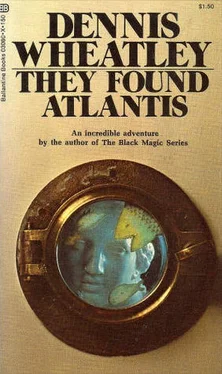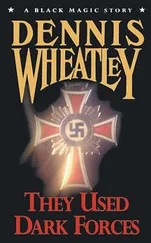'Well, Count! What do you think of this Atlantic trip we are to take together?'
'That it is one of the most interesting upon which any party of people can ever have embarked and I considered myself highly fortunate that chance should have made me a member of it,' replied the Swede affably.
The McKay's thin lips twitched as he suppressed a disbelieving smile. 'You don't really think though that we shall succeed in dragging up the gold from this temple a mile deep in the ocean?'
'Ah, that I do not say, but if we can secure even one small stone from the ocean bed, which bears an inscription, we shall have proved the one-time existence of the lost continent and all histories of the world will have to be rewritten. Think of the romantic thrill in actually being present at such an epoch making discovery.'
'Come now.' The McKay shook his head and gave a low chuckle. 'I thought all you told us of the Flood legends today extremely interesting—but then you are an admirable raconteur and, although your stories served their purpose, you can hardly expect a hardened old sinner like myself to believe them.'
'Why should you think that I was not in earnest?'
'Isn't that rather obvious. Forgive me if I seem rude and of course your private affairs are none of my business but it must be an expensive pastime pursuing Camilla round Europe from one luxury hotel to another in the hope of making her your Countess. Surely this is a heaven sent opportunity to be certain of her company for several weeks to come at her sole charge. I would not put it to you so bluntly if I were not devilish hard up myself and willing to confess that the prospect of the trip at the expense of this lady, who can so well afford it, tempted me to accept her invitation.'
Count Axel's eyes narrowed a fraction but his smile was lazy, tolerant, good natured. '1see,' he murmured after amoment.
'You thought that I was distorting facts in order to persuade her to undertake this voyage and, perhaps, considering it offered excellent opportunities to divert her attention from my empty headed rivals to myself by frequent displays of my erudition. 1 might resent that suggestion most strongly—from some people—but, as it happens, 1 like you sufficiently to let it pass. Actually it is true that this venture comes as a boon in the present state of my finances, yet I assure you that I distorted nothing, and meant every single word I said this afternoon.'
'Then you honestly believe that this fabled continent did exist?'
'I do indeed and if you like I will endeavour to prove it to you.'
'Right. Go ahead, the r.ight is still young, but let's repeat the drinks before we settle down to it—hi, waiter!'
The man paused at the table and took their order, to which Count Axel added: 'Bring me a few sheets of scribbling paper, will you.' Then he turned back to the McKay.
'Am I right in supposing that you have no knowledge of 23
ancient languages—Sanscrit, Hebrew, Maya, Phoenician
and so on I mean?'
'Perfectly.' The McKay's lined face broke into a quick smile. 'Even my Latin is pretty rusty now.'
'Then my dear Captain 1 must ask you to accept my word for the truth of all that I am about to say. I wili give you nothing which is not accepted by all serious students of archaic languages.'
'Certainly, Count.'
'Good. The study of words and their origins has been one of my hobbies for many years and although of course I could not carry on a conversation in these long dead languages which hold the roots of modern speech, 1 know quite a considerable amount about them. Did you know that from all the thousands of tongues in which men convey their thoughts to one another only two original phonetic alphabets had been produced?'
'I don't know the first thing about it,' the McKay admitted, 'but never mind that.'
'Well, it is so. All writing originated in the picture drawings left by primitive people who were on the march from one territory to another so that the other portion of their tribe, which was following, perhaps days later, might learn from their markings on stones and trees the direction they had taken and the good or ill fortune that they had met with in their migration.
'A crude drawing of a sun meant a day, of the moon—a. month, rippling lines—water, crossed spears—a battle with another tribe, the horns of a buck—plentiful game, and so on. In time these signs became simplified or conventionalised so much as often to bear no further resemblance to their original. The Chinese script is an excellent if exaggerated example of the latter case. Each of the thousands of characters which are utterly meaningless to us, or even to all the highly educated among themselves today, originally represented a picture of something—a peach—a cart—a tree bent in the breeze—or a state of emotion shown by the posture of a human figure. Egyptian hieroglyphics were the same although less obscured, because in quite early times the Egyptians decided to retain them as they stood for all sacred writings while bringing in an easier abbreviated set of forms, called the demotic, for everyday use. Thegreat
Maya race of Central America however retained their
hieroglyphic system until the Spanish Conquest.
'Think now how laborious it must have been to convey a message by this picture writing once you passed out of the realm of material things into that of ideas. The number of drawings you would have to chip out of a piece of rock to convey even one sentence such as "The chief in this neighbourhood is a fool but his nephew the witch doctor is cunning,! therefore propitiate to flatter him while tricking the chief into agreeing to your demands."' Count Axel paused. 'But perhaps I bore you with all this?'
'No, no,' the McKay lied politely, 'do go on.'
'The time came when some long-forgotten genius conceived the possibility of utilising already established symbols to convey sounds instead of ideas. The human throat, lips and tongue are capable of producing about twenty distinct sounds and these formed the basis of the alphabet. The letters which have been added since, bringing the total number up to twenty-six, are more or less variations of the originals or interchangeable with them. T and D for example, or V and F, or I and J.
'The alphabets of all European languages are, as you will know, derived from the Phoenician which, up to about four hundred years ago, was the only known archaic writing in the world based on sound and not picture drawing. If you will pause to think for a moment you will realise that the difference between the two—as a medium for the exchange of ideas—is stupendous.'
The McKay, more interested now, nodded. 'Yes, I see that. It must have been as big an advance as from sail to steam in shipping—bigger in fact.'
The waiter arrived with their drinks and the paper for Count Axel, who thanked him and went on:
'Very well then. Now we come to a very interesting fact. A decade or two after Columbus discovered America Diego da Landa, who was the first Bishop of Yucatan, took the trouble to enquire from the Mayas he was seeking to convert to Christianity the meaning of the grotesque hieroglyphics which decorated all their monuments. They told him that it was a form of writing which their predecessors had handed down to them and, to his utter amazement, he
found that they were not picture drawings conventionalised but the letters of a phonetic alphabet.
'Now it was curious enough to find such a system in existence among the Mayas of Central America at all when all the great civilisations of Asia, Europe and Africa together had only succeeded in producing one—the Phoenician—but what is stranger still is that these two alphabets—the only ones of their kind—should bear an absolutely striking resemblance to each other.
Читать дальше












